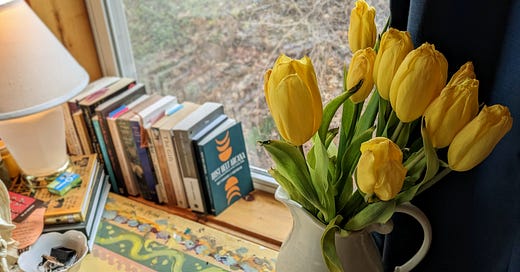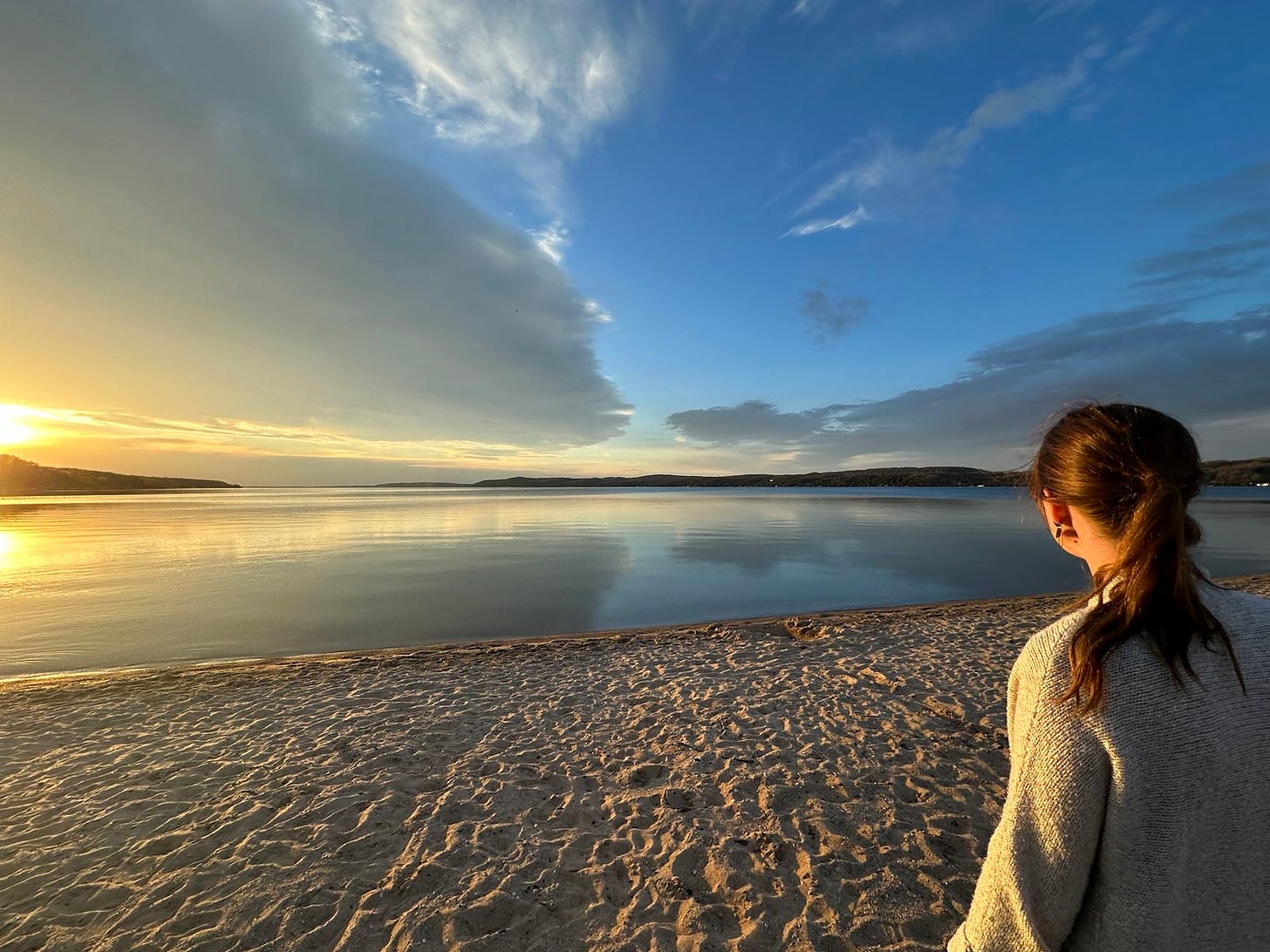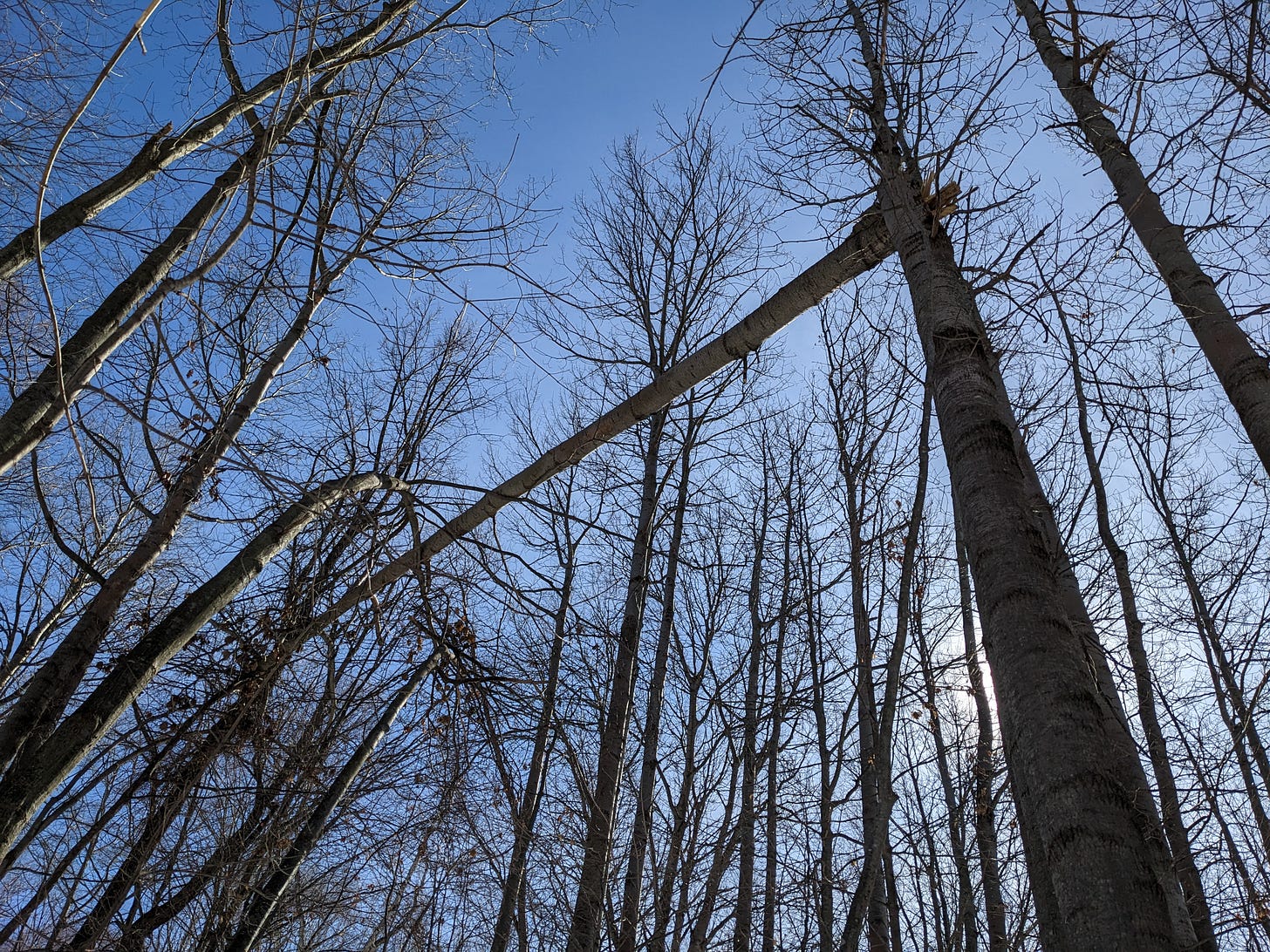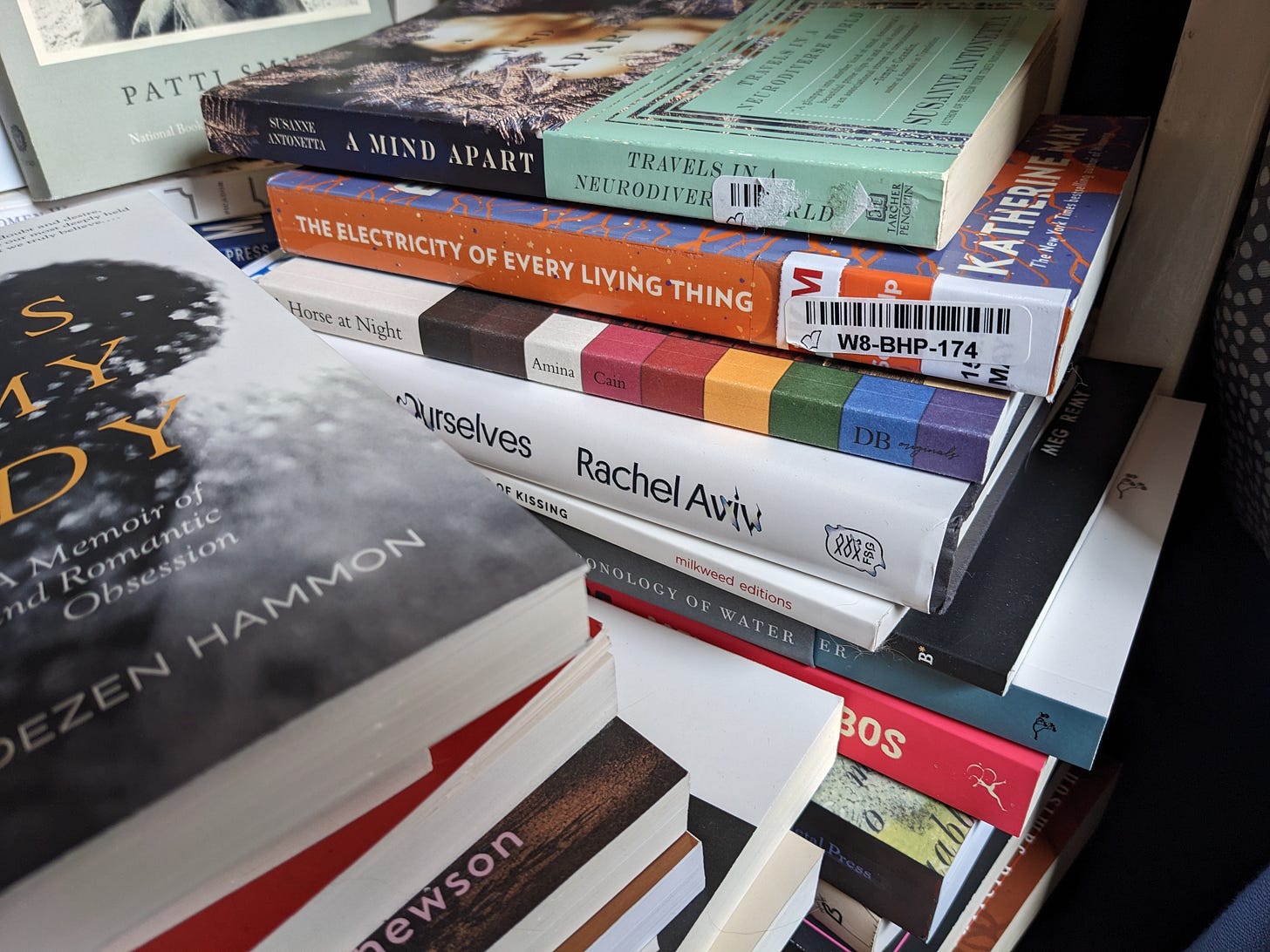This spring I moved to northern Michigan, a move spurred by a lifelong love of/connection to this place, and a move that has me re-thinking how place interacts with the creative process.
Place-ness and here-ness aren’t my natural ways of being. For me, the act of writing taps into my hyperfocus/time agnosia1 more than almost anything else. Writing tends to carry me out of my body, out of my sense of time, out of any tethering. I’ve liked it that way—especially for the past eight or nine years, I’ve been almost place-agnostic. The pandemic helped. We all became floating bodies on a Zoom screen, untethered from our places even as we were confined to them.
This must have been rumbling in the background last week while I went on a walk, because an odd phrase popped in: A computer is not a place.
Sometimes phrases fall in my ear, and if they have music to them, it’s a nudge to write. But if they’re ugly—and computer is an ugly, clunky word—then I get the sensation of being alerted, even warned.
A computer is not a place.
I wanted to say: but what about online community? What about all those folks I’ve written with via a screen? What about the virtual readings and the newsletters and—
And the phrase seemed ready for me, because it punched back: I said place, not community. A computer is not a place.
Ok.
I’ve been sitting with this as I unpack boxes, as I hang art, as I go for more walks. I’ve started to wonder if I’ve taken it for granted, being so place-agnostic. Maybe I’m being asked to remember that place/here-ness is a choice. A creative element in its own right. Maybe I’ve gotten too passive about the choice I made years back (to be a person of no-place, to work and think of myself so virtually), so now that choice holds less power, less possibility.
A favorite mantra of mine has returned now, but in a different tone: Locate yourself.
I’ve often shared this with fellow writers in workshops I led, when prompting folks to take field notes as they write, especially during revision. To me, field notes are a way-finding/way-making tool. They break down the abstractness of the creative act. They’re a record of creative choices made, a record of experiments and themes and observations. They bring a kind of anthropological curiosity to a project: the writer observes herself in her choices, her struggles, her ebbs and flows. She makes a record of it, which can serve many purposes: bringing closure to the process, resurfacing from deep work, celebrating risks taken, and giving herself a place to come back when she picks up the work again.
Now I'm wondering what else it can mean, to locate yourself.
When I get stuck on an odd phrase or question, I need to free-associate for awhile. I need to look up the etymology of words. I poke around and ask for clarification, and clarity often comes via comparison—
Place, from French, for “spot,” or Latin platea, for “open space.”
Community, on the other hand, comes from “common ownership, public, general.”
I’m struck by how place is rooted in specificity and community feels more generic.
Maybe when I say: Locate yourself. what I’m really saying is: Try being more specific.
Maybe when I imagine pulling my writing practice down from ether, out of vague process, what I’m really saying is: Give it a spot to land.
And computer? From the Latin putare, meaning to think, to prune. An interesting contrast to the “open space” connotation of place above. Why is a computer not a place? Maybe because it prunes. (I see all those floating Zoom heads again, pruned away from their bodies, pruned away from their nearest intersections and homes.)
Which makes me wonder: what have I pruned away by being place-agnostic, perhaps even place-averse, in my creative practice?
And how do things open up if writing is done as a kind of place-making?
I don’t necessarily mean just writing about place itself. I mean the practice of coming to the page as well as the material on the page. Two more free-associated curiosities along these lines:
The concept of mise en place, or gathering all your ingredients together before cooking. The idea is that it makes cooking easier, but now I also wonder about the way it says to the cook, “You are here.” (
, whose work I footnote in the next point, also has a great post on this.)The notion that folks with ADHD (like me) supposedly lack object permanence.2 I have misgivings around how this gets framed, but I do know I have an “out of sight, out of mind” way of being. I forget things I care about, food I really meant to eat, books I was completely taken with… just because they were physically moved or not visible in a concrete way.
When something lacks the specificity and continuity of having a place—no matter how much I need it or love it—it often gets lost to a generic (forgotten) field in my mind.
I don’t know how to explain this to someone who is not wired this way… but it's not a cute-clumsy forgetting. It’s not ditziness. I’ll forget what music feeds me, what books comfort me, and so on—no matter how long I have loved them. It’s like I just forget I have resources. And then one day I’ll stumble into them again and think, my god, I really needed this last week!
How might this create an undercurrent of mis-placement that might call for some adaptations for a writer like me? (How often do I feel creatively lost and off the map entirely, when in reality I’ve only forgotten—misplaced—a tool, playlist, relationship, etc. that usually helps?)
I worried I had dragged this silly, ugly phrase so far that the whole exploration had become meaningless. But then I started sorting my books this weekend. I had unpacked them, but I got the idea that maybe I wanted certain books in certain places, for certain reasons. To try being more specific.
I decided to gather all the books related to my current project, which is shaping up to be something of an essay collection or memoir-in-essays. Maybe it would be nice to have all the books on one chair, right next to where I write. This felt like a way of saying here, I am here.
I was surprised at how happy the little act of gathering the books was—
first, the joy of feeling their weight in my hands, their textures. Remembering how tactileness is an aspect of place, how tactileness has always been important to me.
and then the fact of the number of books and the pile they made on the chair, which made me see (concretely) that I’ve underestimated how deep into this work I am. Each book is a different way I’m showing up for this project. Each one is a different thread I’ve been pulling on. Some I’m reading as research. Some I’m reading because they feel like kindred spirits to me. Some I’m reading to think about form and style, as I figure out the style of my own work.
Because of how I untether and float away, I tend to miss how things are accumulating… I tend to doubt that anything is accumulating at all in my art. The books have a physical weight and a specificity that tells me something is actually adding up here.
Coming through this ugly phrase and this little parsing habit, I’m now playing with a few possibilities:
Choosing specificity as much as possible, finitely and vigorously. Risking the texture and tone of a very specific practice or sentence (risking writing a whole damn letter about it). Making it an experiment. Not as an accountability thing (in the way that people wax on about having “specific measurable outcomes”) but instead as a way of noticing what language arrives or what connection I feel to my practice/my instincts when they have a very specific place to begin.
Staying alert to contrast. The more specific you are, the more shades of possibility you’ll perceive and get to choose between—at least that’s my hunch.
Discerning my tools from my places. Trying out stronger separation between those two. Being in place, with place, of place, shaped by place. Starting my practice with connection to a place, rather than connection to a tool. (A computer is not a place, but Lake Michigan is.)
I’ve seen folks using the phrase “time agnosia” instead of “time blindness” when they talk about their experience of neurodivergence, and I’ve been trying that out in my own phrasing… but I still feel like there’s a lot of languaging yet to happen around what this experience really is (and, for me, how it shapes and/or is set off by a creative practice like writing). There’s another newsletter here on Substack,
, that I love for this kind of critical thinking, including this post on time and this post on identity vs. disorder.Again, wherever I use existing ADHD language I feel the need to caveat, question, push, remix. “Lacking object permanence” is another way of baking in the deficit-framing of this mind/temperament/way of being. To me, it also adds to the vibe of ADHD being childlike and immature. Another newsletter I appreciate in this vein (but apparently have been reading without being subscribed to until just this week?) is
.







I see humanity in this post. I believe the arts are going to be important in this age of ai.
The coast of Oregon, which is really beautiful, inspired me to write, after almost a lifetime of living in the Midwest.
Beautifully written with beautiful photos too.
ooh I really love this, Emily. the imperative to "locate yourself" is such a rich one.